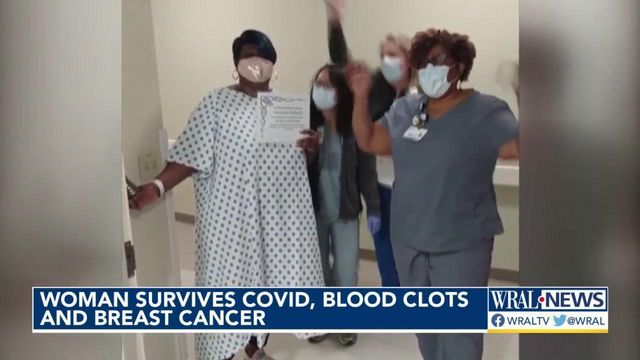Raleigh woman warns against delayed breast cancer screening after overcoming 3 life-threatening health scares
For the cause of Breast Cancer Awareness month, a Raleigh woman was eager to share her own message of survival.
Posted — UpdatedA different emergency health issue led her to Duke Raleigh Hospital, but the celebration after several weeks of hospital care was for overcoming a breast cancer diagnosis.
Upon being released after recovery from breast cancer treatment, Duke patients get to ring a hallway bell, a symbol of hope for others with the life-threatening disease.
For Roberts, her first health scare came while on the job as a cook at a Raleigh nursing facility. "COVID hit me like a rock," said Roberts. COVID-19 quickly sapped her of her strength and kept her in relative isolation at Duke Raleigh Hospital.
Daughter Talaya McCraney stayed as close as she could. She said, "I just had to hold my composure, because I had to stay strong for mom.
Routine imaging revealed a second health concern, blood clots in Roberts’ lungs. Then, the last of the three surprises, breast cancer. "I had a cyst on my left breast and cancer in the right breast," said Roberts.
For many women, the pandemic provided an excuse to delay recommended breast cancer screening, according to Duke radiologist Dr. Karen Johnson. She says delays are not without risk. "You’re potentially putting off an early detected breast cancer," said Dr. Johnson.
Dr. Johnson says the latest screening tools, including 2D, 3D mammography, offer even more hope for early detection. She warns, having no family history of breast cancer is no assurance of immunity. "Over 80% of breast cancers occur in women who have no family history of breast cancer," said Dr. Johnson.
Roberts now considers her COVID-19 diagnosis as a blessing. "Because if I hadn’t got COVID, I would have never gone to have a breast exam," said Roberts.
She says she would also have been unable to ring the special hallway bell before she was released to go home.
The tradition involves just 3 rings of the bell, but Roberts added several more. She said, "I wanted the whole building to hear that someone made it and you’re going to make it too. Death knocked on my door 3 times and I made it through!"
Related Topics
• Credits
Copyright 2024 by Capitol Broadcasting Company. All rights reserved. This material may not be published, broadcast, rewritten or redistributed.






